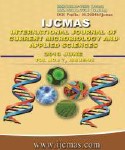


 National Academy of Agricultural Sciences (NAAS)
National Academy of Agricultural Sciences (NAAS)

|
PRINT ISSN : 2319-7692
Online ISSN : 2319-7706 Issues : 12 per year Publisher : Excellent Publishers Email : editorijcmas@gmail.com / submit@ijcmas.com Editor-in-chief: Dr.M.Prakash Index Copernicus ICV 2018: 95.39 NAAS RATING 2020: 5.38 |
Fruits and vegetables are often referred to as “protective foods” because they are rich in minerals and vitamins. Fruit production is severely impacted by various biotic and abiotic stresses and during the past, efforts have been made by conventional breeding programs to mitigate these problems. However, classical breeding has had little success in improving fruit plants and is constrained due to long juvenile period, genetic erosion, genetic drag and reproductive barriers that limit the transfer of favourable genes from diverse genetic resources. A transgenic crop plant harbors an additional, stably integrated and expressed, foreign gene(s) from trans-species by the process called genetic transformation. In the last two decades, genetic transformation of fruit crops has focused mainly on enhancing resistance to biotic stresses and increasing tolerance to abiotic ones. However, it is worthwhile to mention that field evaluation and commercialization of these crops is very limited. Advances in genomics in the next few years is to put a major impact on this field. While it is difficult to determine the changes in public acceptance of transgenic fruits in the future, the advances in alternatives like cisgenics, genome editing etc. may considerably affect public opinion.
 |
 |
 |
 |
 |